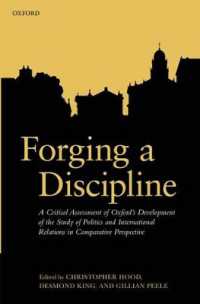Full Description
The book charts the baseline of the transformation of sociological thought through a critical approach to two key works of sociological theory, Durkheim's The Rules of Sociological Method, and Giddens's New Rules of Sociological Method, works that in their day marked the canon of sociological thought, while today they have come to be seen as antiquated knowledge that needs to be overcome. In this book, Jiří Šubrt attempts - within the framework of an approach he calls 'critical eclecticism and reconfigurationism' - to outline approaches that should bring about desirable changes in contemporary sociological thought. Within his conception of sociology as a science of social processes, he introduces a number of theoretical innovations that include the concept of institutional orders, the research strategy of the 'duplex', and the terms 'transmitters' and 'multipliers'. The book pays particular attention to questions of sociological reflection on time and problems of predicting the future. It points to the ways in which our thinking is both influenced and limited in times of relativism and uncertainty.








